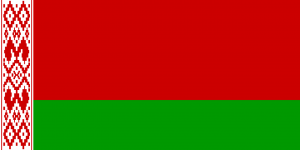Language/Belarusian/Grammar/Future-Tense
Hi Belarusian learners! 😊
In this lesson, we will explore the Future Tense in Belarusian grammar. We will cover the basics, such as verb conjugations, as well as more advanced topics, like the difference between the Simple Future Tense and the Future Perfect Tense. Let's get started!
Don't hesitate to look into these other pages after completing this lesson: Prepositions & Superlatives.
Basics of the Future Tense[edit | edit source]
First of all, let's refresh what the Future Tense is. This tense is used to express actions that will happen in the future. In Belarusian, the Future Tense is formed by adding certain endings to the infinitive form of the verb. For example:
| Belarusian | Pronunciation | English |
|---|---|---|
| Я буду гуляць | ya budu hulyats' | I will walk |
| Ты будзеш гуляць | ty budzesh hulyats' | You will walk |
| Ён будзе гуляць | yon budze hulyats' | He will walk |
| Мы будзем гуляць | my budzem hulyats' | We will walk |
| Вы будзеце гуляць | vy budzecye hulyats' | You (plural) will walk |
| Яны будуць гуляць | yany buduts' hulyats' | They will walk |
As you can see, the Future Tense in Belarusian can be formed by adding the prefixes буду-/будзеш-/будзе-/будзем-/будзеце-/будуць- to the verb. It is important to note that these prefixes do not change, regardless of the verb used.
The Simple Future Tense vs The Future Perfect Tense[edit | edit source]
In Belarusian, there are two types of Future Tenses: The Simple Future Tense and the Future Perfect Tense.
The Simple Future Tense is used to describe an action that will happen in the future without any relation to any other event or state. For example:
- Я буду падаваць снег. (I will be falling snow.)
On the other hand, the Future Perfect Tense is formed by using the auxiliary verb "мець" (to have) + past participle. This tense is used to describe an action that will be completed before another future event. For example:
- Я буду здаваць экзамен праз два тыдні. Я мець скончаны ўваход на ўніверсітэт да таго часу. (I will be taking my exams in two weeks. I will have completed my university application by then.)
Pay attention to the use of the auxiliary verb "мець" in the second example. This verb is conjugated in the Future Tense to match the subject, while the main verb is in the past participle form (скончаны).
Irregular Verbs in the Future Tense[edit | edit source]
Just like in many other languages, there are some irregular verbs in Belarusian that do not follow the standard Future Tense pattern. Here are some examples:
| Belarusian | Pronunciation | English |
|---|---|---|
| браць (to take) | brats' | I will take |
| меркнуць (to fade) | merknuts' | You will fade |
| быць (to be) | bıć | He will be |
| ісці (to go) | istsi | We will go |
| ведаць (to know) | vyedats' | You (plural) will know |
| даваць (to give) | dats' | They will give |
As you can see, these verbs seem to have completely different endings in the Future Tense than the ones we previously mentioned. It is important to memorize these irregular verbs and their conjugations if you want to speak Belarusian fluently.
Examples[edit | edit source]
To better understand the Future Tense in Belarusian, let's see some examples in context:
- Person 1: Ты пойдзеш са мной на кафэ? (Will you come with me to the cafe?)
- Person 2: Дык, я буду свабодны ўвечар. (Sure, I will be free in the evening.)
- Person 1: Што ты будзеш робіць у сваёй выходнай? (What will you do on your day off?)
- Person 2: Я планую пайсці ў кіно. (I plan to go to the cinema.)
- Person 1: Яго дзяці будуць навучацца ўніверсітэце гэтай восені. (His children will go to the university this fall.)
- Person 2: Ужо забраліся за адукацыю? (Have they already started their education?)
To improve your Belarusian Grammar, you can also use the Polyglot Club website. Find native speakers and ask them any questions!
Sources[edit | edit source]
Other Lessons[edit | edit source]
- Personal Pronouns
- Conditional Mood
- Negation
- Prepositions
- Possession
- Nouns
- Pronouns
- Possessive Pronouns
- Gender

